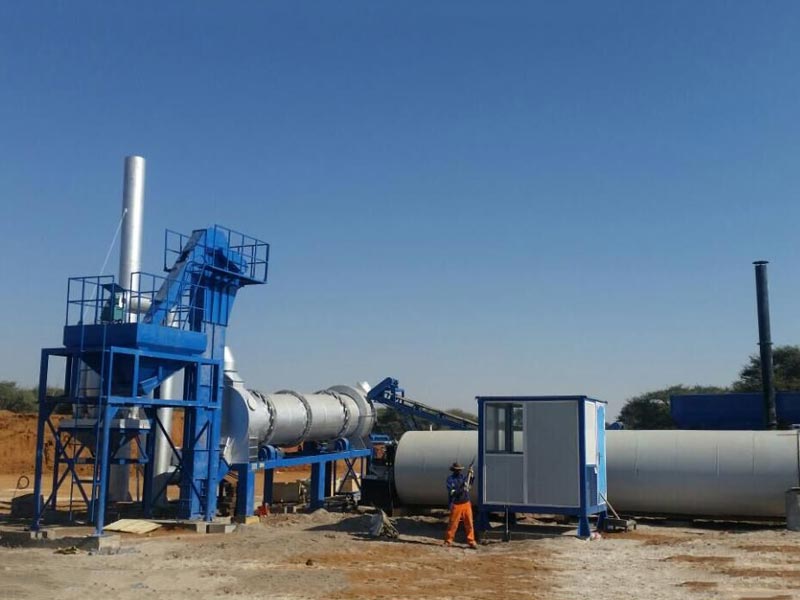The Impact of the Accuracy of the Weighing System on Asphalt Plants
In road and bridge construction, ensuring the quality and consistency of asphalt is critical. The weighing system in an asphalt plant plays a key role in determining the final product’s quality. Accurate weighing of raw materials is essential for producing high-quality asphalt that meets the specific standards required for durable, long-lasting road surfaces. In this blog post, we will explore the importance of the accuracy of the weighing system in asphalt plants, how it affects the production process, and its influence on the overall asphalt plant price and project outcomes.
Contents |
[edit] The Role of the Weighing System in Asphalt Production
The weighing system in an asphalt plant is responsible for measuring the correct quantities of aggregates, bitumen, and additives to create the asphalt mix. This system ensures that the right balance of materials is used, which directly affects the asphalt’s properties, such as strength, flexibility, and durability. Whether operating a large asphalt batch plant or a mini asphalt plant, accurate measurement is crucial to producing a consistent product that meets the specifications for various types of road construction.
Inaccurate weighing can lead to several issues, including poor mix quality, material waste, and inconsistencies in production. These problems not only affect the performance of the asphalt but can also lead to increased costs and delays in construction projects. Ensuring the accuracy of the weighing system is therefore essential for maintaining the efficiency and quality of asphalt production.
[edit] 1. Impact on Asphalt Quality
One of the primary concerns with inaccurate weighing is the potential for compromised asphalt quality. Asphalt is a mixture of various materials, each contributing to specific properties. For example, bitumen provides the binding quality, while aggregates give the asphalt its structure and strength. If the quantities of these materials are not accurately measured, the final mix may not have the required properties for the intended use.
For instance, too much bitumen can lead to a soft, unstable mix, while insufficient bitumen may result in a brittle asphalt that cracks under pressure. Similarly, incorrect aggregate ratios can affect the asphalt’s ability to withstand heavy traffic loads, extreme temperatures, and other environmental conditions. By maintaining accuracy in the weighing system, asphalt plants can produce asphalt that meets the necessary performance standards for road construction, ensuring longer-lasting and safer pavements.
[edit] 2. Influence on Production Efficiency
The efficiency of the asphalt production process is heavily reliant on the accuracy of the weighing system. In an asphalt batch plant, the mix is prepared in batches, and each batch requires precise measurement of the ingredients. Inaccurate weighing can cause delays in the batching process, as the plant may need to reweigh or correct errors, leading to wasted time and reduced output.
In contrast, inaccurate measurement in a continuous asphalt plant can cause continuous production issues, resulting in an unstable asphalt supply. Whether operating a large-scale facility or a mini asphalt plant, the ability to consistently produce the correct amount of high-quality asphalt without interruptions is crucial for meeting project timelines and reducing operating costs.
[edit] 3. Reducing Waste and Cost Implications
An accurate weighing system helps reduce material waste by ensuring that only the correct amount of each material is used in the mix. Without precise measurements, there is a higher likelihood of overuse or underuse of materials, leading to wasted resources and higher costs. For example, overuse of bitumen or aggregates not only increases production costs but also reduces the efficiency of the asphalt, leading to a subpar final product.
Inaccurate weighing can also impact the asphalt plant price, particularly in the case of smaller, more cost-conscious projects. For instance, a mini asphalt plant with an inaccurate weighing system may produce a lower-quality product, leading to higher maintenance costs or the need for additional material purchases to compensate for defects. In the long run, investing in a more accurate weighing system helps to ensure cost-effectiveness by optimising material usage and preventing costly mistakes.
[edit] 4. Compliance with Industry Standards
The road and bridge construction industry is governed by strict standards and regulations to ensure the quality and safety of asphalt. An accurate weighing system is crucial for complying with these standards, as it guarantees that the asphalt produced meets the required specifications for various types of infrastructure projects. Failure to meet these standards can result in costly rework, project delays, or, in the worst case, failure of the road surface.
The importance of accuracy in the weighing system is even more critical when using recycled materials, such as reclaimed asphalt pavement (RAP). The use of RAP requires precise control over the mix to ensure that the final asphalt maintains the desired strength and durability. Without an accurate weighing system, the quality of the recycled asphalt may be compromised, potentially leading to premature pavement deterioration.
[edit] Conclusion
The accuracy of the weighing system in an asphalt plant has a direct and significant impact on the quality, efficiency, and cost-effectiveness of asphalt production. Whether operating a large asphalt batch plant or a mini asphalt plant, ensuring precise measurement of materials is essential for producing high-quality asphalt that meets industry standards. Accurate weighing minimises waste, reduces production costs, and helps meet project timelines, ultimately contributing to better road and bridge construction outcomes.
Investing in a reliable and accurate weighing system is crucial for any asphalt plant, as it not only improves the performance of the asphalt mix but also helps to avoid costly errors and delays. Whether for large-scale projects or smaller local developments, maintaining accuracy in the production process is key to ensuring long-lasting, durable pavements and the successful completion of road and bridge construction projects.
Featured articles and news
One of the most impressive Victorian architects. Book review.
RTPI leader to become new CIOB Chief Executive Officer
Dr Victoria Hills MRTPI, FICE to take over after Caroline Gumble’s departure.
Social and affordable housing, a long term plan for delivery
The “Delivering a Decade of Renewal for Social and Affordable Housing” strategy sets out future path.
A change to adoptive architecture
Effects of global weather warming on architectural detailing, material choice and human interaction.
The proposed publicly owned and backed subsidiary of Homes England, to facilitate new homes.
How big is the problem and what can we do to mitigate the effects?
Overheating guidance and tools for building designers
A number of cool guides to help with the heat.
The UK's Modern Industrial Strategy: A 10 year plan
Previous consultation criticism, current key elements and general support with some persisting reservations.
Building Safety Regulator reforms
New roles, new staff and a new fast track service pave the way for a single construction regulator.
Architectural Technologist CPDs and Communications
CIAT CPD… and how you can do it!
Cooling centres and cool spaces
Managing extreme heat in cities by directing the public to places for heat stress relief and water sources.
Winter gardens: A brief history and warm variations
Extending the season with glass in different forms and terms.
Restoring Great Yarmouth's Winter Gardens
Transforming one of the least sustainable constructions imaginable.
Construction Skills Mission Board launch sector drive
Newly formed government and industry collaboration set strategy for recruiting an additional 100,000 construction workers a year.
New Architects Code comes into effect in September 2025
ARB Architects Code of Conduct and Practice available with ongoing consultation regarding guidance.
Welsh Skills Body (Medr) launches ambitious plan
The new skills body brings together funding and regulation of tertiary education and research for the devolved nation.
Paul Gandy FCIOB announced as next CIOB President
Former Tilbury Douglas CEO takes helm.
























